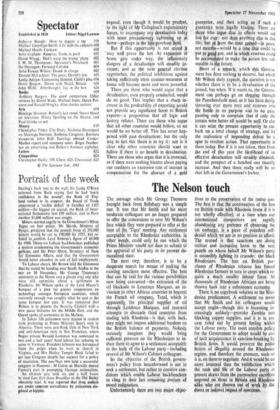The Nelson touch
The message which Mr George Thomson brought hack from Salisbury was n simple one. It was that Mr Smith and his more moderate colleagues are no longer prepared to offer the concessions to save Mr Wilson's face which they were prepared to offer at the time of the 'Tiger' meeting. Any settlement Acceptable to the Rhodesian authorities, in other words, could only he one which the Prime Minister would not dare to submit to the approval of his party in its present de- moralised state.
The next step, therefore, is to be a desperate search for means of making the existing sanctions more effective. The best that can be Said for the various possibilities now being canvassed—the extension of the oil blockade to Lourenco Marques, an in- vitation to other African countries to boycott the French oil company, Total, which is apparently the principal supplier of oil through Lourenco Marques, and renewed attempts to dissuade third countries from trading with Rhodesia—is that, with luck, they might not impose additional burdens on the British balance of payments. Nobody seriously imagines they would bring sufficient pressure on the Rhodesians to in- duce them to agree to a settlement acceptable to the bulk of the Labour party—including several of Mr Wilson's Cabinet colleagues.
So the objective of the British govern- ment's policy from henceforward is not to seek a settlement, but rather to contrive con- ditions which enable Labour backbenchers to cling to their last remaining posture of moral indignation. lions to the preservation of the status quo. The first is that the continuation of the ban on British trade with Rhodesia (even if it is not wholly effective), at a time when our international competitors are rapidly abandoning any pretence of observing the UN 11P4.1i9, is 4 piece of pointless self- denial which we are in no position to afford. The second is , that sanctions are doing serious and increasing harm to the verY people on whose behalf Mr Wilson's party is ostensibly fighting its crusade: the black Rhodesians. The ban on British pur- chases of Rhodesian tobacco has forced Rhodesian farmers to turn to crops which re- quire a much smaller labour force. SO thousands of Rhodesian Africans are being thrown back into a subsistence economy. There is no copybook solution to the Rho- desian predicament. A settlement on terms that Mr Smith and his colleagues would accept might—though this is becoming in- creasingly unlikely—provoke Zambia into blocking copper supplies, and it is in any case ruled out by present feeling within the Labour party. The most sensible policy for the Government to adopt would be one of tacit acquiescence in sanction-breaking by British firms. It would preserve the polite fiction of illegality around the Rhodesian regime, and therefore the pressure, such as it is, on them to negotiate. And it would be no more immoral than the satisfaction which the rank and file of the Labour party at present draws from the purposeless sacrifices imposed on those in Britain and Rhodesia alike who are thrown out of work i the direct or indirect impact of sanctions.


































 Previous page
Previous page